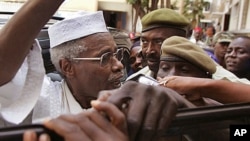Senegal has suspended its decision to extradite former Chadian leader Hissene Habre after the United Nations said he could be tortured if sent home to Chad.
Senegalese Foreign Minister Madicke Niang says President Abdoulaye Wade's government has suspended its expulsion order against Hissene Habre and will now open “urgent” talks with the United Nations, the African Union and the European Union to find a solution.
Senegal's announcement Friday that Habre would be extradited on a charter flight Monday was meant to end years of legal arguments about what to do with the former Chadian leader who has been living in Dakar since he was overthrown more than 20 years ago.
The U.N. high commissioner for human rights Sunday urged the Senegalese government to review its decision. In a written statement, Navi Pillay said that Senegal, as a party to the Convention Against Torture, may not extradite anyone to a state “where there are substantial grounds for believing he would be in danger of being subjected to torture.”
Pillay said Senegal, at the very least, must obtain fair trial guarantees from the Chadian government. She says sending him home without those guarantees, “may amount to a violation of international law.”
A 1992 Truth Commission in Chad found Habre responsible for widespread torture and the deaths of at least 40,000 people. Senegal put him under house arrest in 2005, when he was charged by the Belgian government for crimes against humanity based on cases brought by Chadians living in Belgium.
In 2008, Chad tried him in absentia and sentenced him to death for planning to overthrown the government.
About 100 Habre supporters gathered outside his home to celebrate Senegal's decision to suspend the extradition. Kebla Makaida is a Chadian politician living in Senegal.
Makaida says it is a celebration not only for Hissene Habre but for the victory of all democratic people who peacefully oppose unilateral and arbitrary decisions relating to kidnapping in Africa.
Habre's lawyer said the extradition amounted to a kidnapping and warned that his client would be shot on arrival in N'Djamena.
Amnesty International says Senegal has avoided putting Habre on trial for years, despite its international obligations to do so. The group says sending him back to Chad, where he faces the death penalty and an unfair trial, would bring no real justice to the thousands who suffered human rights violations during his eight-year rule.
Senegal Suspends Extradition of Former Chadian Leader












